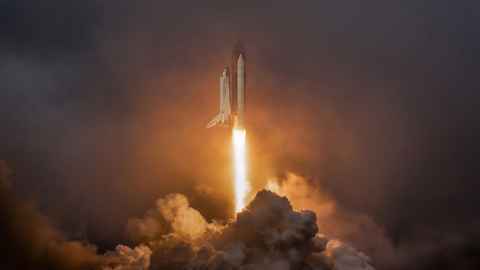Another space to punch above our weight
3 August 2025
Opinion: The success of NZ’s space sector can sometimes get short shrift in a country whose agricultural exports are often seen as our defining characteristic, says Richard Easther.

A new semester has kicked off, and I am teaching my half of ‘An Introduction to Rocket Science’, a new(ish) course at the University of Auckland.
It’s about rocket science in the broad sense. On the one hand, human activity in space is governed by the iron laws of physics – home ground for me. But it is equally shaped by political and economic imperatives.
Putting the course together has been a fascinating journey. Know, for example, how military rockets made their way to Europe? Iron rockets were used by the army of Mysore to such great effect against the British in India that the British copied them, developing them into Congreve rockets. These provided the “rockets’ red glare” of the US national anthem and they were subsequently deployed here in Aotearoa New Zealand against the legendary Hone Heke. (Who was largely unbothered by them.)
In my first lecture, I wanted to set the scene with a lightning review of the ‘space race’, and opened with a clip of John F. Kennedy’s “We Choose to Go To the Moon” speech. I felt the need to check that my audience, most of whom were born this century, knew who Kennedy was – whereas I remember the very last of the moon landings.
Reminders of your age (relative to your students) are an occupational hazard for professors. However, it also underlined the extent to which until very recently ‘space’ mostly happened somewhere other than New Zealand. For today’s students, however, Rocket Lab has changed that. One of its achievements is to exist simultaneously as a Kiwi and an American enterprise but it launches from Mahia and builds rockets here in Auckland.
Surprisingly, I keep meeting New Zealanders who are only vaguely aware of just how singular an achievement this is. My students are – that’s why most of them signed up for this class. But even many of them did not know that our small country is Number 3 in the global league table for orbital launches in 2025. They did know after I showed them this plot, though.


As a physicist, it can sometimes feel that my field gets short shrift in a country whose agricultural exports are often seen as our defining characteristic. But rockets run on physics, so the success of our space sector is particularly sweet music to my ears.
Better still, Rocket Lab may not be a one-off; Dawn Aerospace is testing an un-crewed vehicle that will fly to the edge of space. Dawn would likely get more attention from our media if it were not sharing a small country with a company that would be a big deal in whichever country it made its home. That said, Dawn is clearly going for a ‘slow and steady’ approach. It cannily supports itself by building thrusters for satellites and this revenue stream gives it more breathing room than start-ups that go all-in on developing a single product.

In New Zealand our current Government has made it clear that it values only science with immediate economic returns. Conversely, Kennedy said very little about the financial benefits of space exploration in his speech, but focused on its capacity to inspire. At one point he asks “Why climb the highest mountain?” and almost any New Zealander will spot the reference to Sir Edmund Hillary, who had summited Everest less than a decade earlier.
Between political instability, economic constraints and climate uncertainty this not an easy time to be a young person. I am far from an uncritical enthusiast when it comes to space activity, but Kennedy recognised that space, like mountains, has a hold on the human imagination that transcends balance sheets.
Consequently, it is worth pausing to appreciate the extent to which New Zealand and New Zealanders have achieved something remarkable in this arena. And I am looking forward to seeing what we – and my students – will do next.
Originally published on Richard Easther’s blog, Excursion Set
Professor Richard Easther is from the Department of Physics at the Faculty of Science.
This article reflects the opinion of the author and not necessarily the views of Waipapa Taumata Rau University of Auckland.
This article was first published on Newsroom, Another space to punch above our weight, 3 August, 2025
Media contact
Margo White I Research communications editor
Mob 021 926 408
Email margo.white@auckland.ac.nz